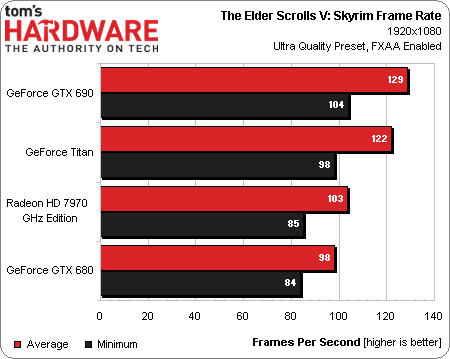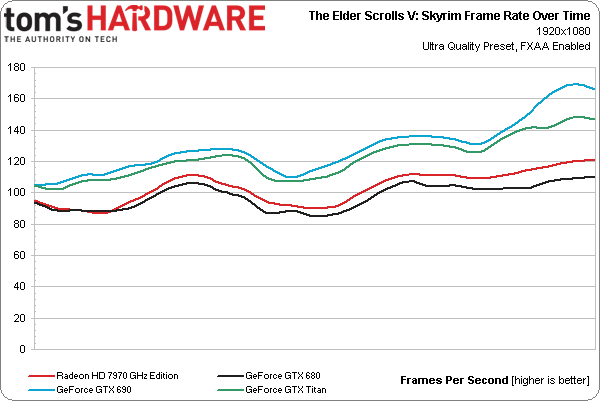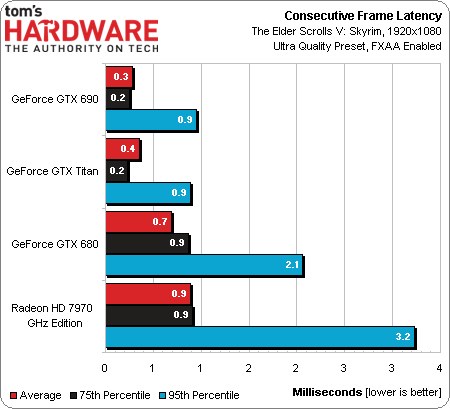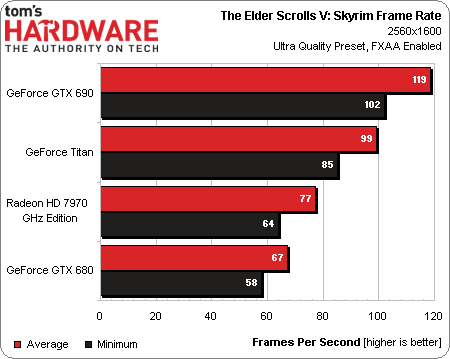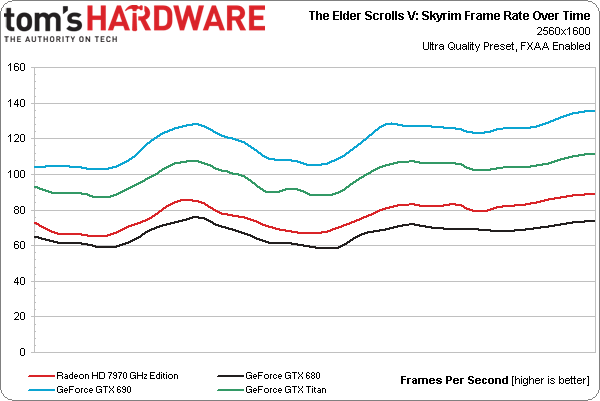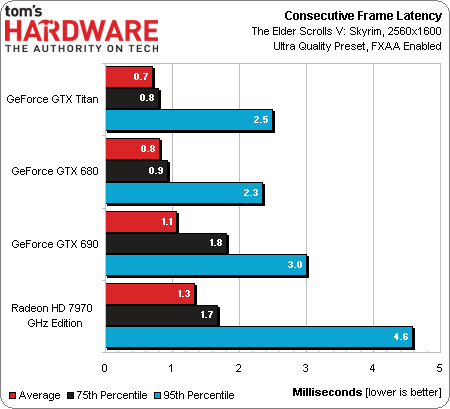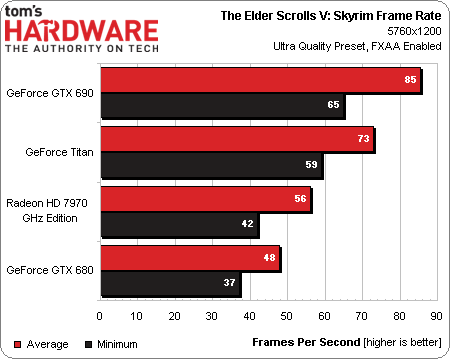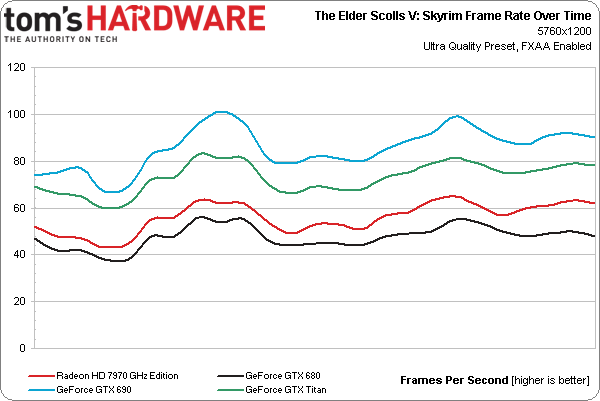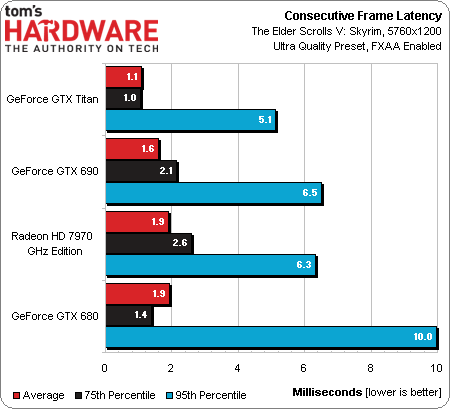Benchmarking GeForce GTX Titan 6 GB: Fast, Quiet, Consistent
We've already covered the features of Nvidia's GeForce GTX Titan, the $1,000 GK110-powered beast set to exist alongside GeForce GTX 690. Now it's time to benchmark the board in one-, two-, and three-way SLI. Is it better than four GK104s working together?
Results: The Elder Scrolls V: Skyrim
Resolution: 1920x1080
Once severely platform-limited, Skyrim is now influenced more by graphics performance, even at 1920x1080. Really though, the difference between GeForce GTX 690’s average and GeForce GTX 680’s, at opposite ends of the spectrum, is insignificant.
Again, with frame rates this high, performance over time doesn’t yield any fresh data. Minimums in excess of 80 FPS are more than enough, naturally.
This is another one of the games that AMD optimized for in its latest beta Catalyst driver, and the company’s effort is reflected in much more competitive consecutive frame latency results.
GeForce GTX Titan, meanwhile, demonstrates sub-1 ms latency, even at the 95th percentile level.
Resolution: 2560x1600
Average and minimum frame rates suggest playability across the board, yet again. Titan continues to fall somewhere in between GeForce GTX 690 and Radeon HD 7970 GHz Edition.
Get Tom's Hardware's best news and in-depth reviews, straight to your inbox.
Our scale changes compared to 1920x1080, but the results are pretty much the same over time.
Nvidia’s GeForce GTX Titan continues exhibiting exceptionally-low consecutive frame latency, matching GeForce GTX 680. AMD’s 95th percentile numbers are still the highest; however, they’re an order of magnitude lower than some of the other games we’ve already tested.
Resolution: 5760x1200
Titan maintains its second-place position behind GeForce GTX 690. Both cards deliver playable performance in Skyrim, as do the Radeon HD 7970 GHz Edition and GeForce GTX 680.
GeForce GTX 680 only dips under 40 FPS momentarily in our benchmark. It spends more time in the mid-40 FPS range.
Today’s all about GeForce GTX Titan, so we start by recognizing the GK110-based board’s very low consecutive frame latency measurements. But it’s also important to recognize AMD’s performance, which matches the GeForce GTX 680’s average consecutive frame latency and technically beats it in our 95th percentile analysis (though we’re not going to quibble about sub-10 ms numbers).
Current page: Results: The Elder Scrolls V: Skyrim
Prev Page Results: Hitman: Absolution Next Page Results: World Of Warcraft: Mists Of Pandaria-
Novuake Pure marketing. At that price Nvidia is just pulling a huge stunt... Still an insane card.Reply -
whyso if you use an actual 7970 GE card that is sold on newegg, etc instead of the reference 7970 GE card that AMD gave (that you can't find anywhere) thermals and acoustics are different.Reply -
cknobman Seems like Titan is a flop (at least at $1000 price point).Reply
This card would only be compelling if offered in the ~$700 range.
As for compute? LOL looks like this card being a compute monster goes right out the window. Titan does not really even compete that well with a 7970 costing less than half. -
downhill911 If titan costs no more than 800USD, then really nice card to have since it does not, i call it a fail card, or hype card. Even my GTX 690 make more since and now you can have them for a really good price on ebay.Reply -
spookyman well I am glad I bought the 690GTX.Reply
Titan is nice but not impressive enough to go buy. -
hero1 jimbaladinFor $1000 that card sheath better be made out of platinum.Reply
Tell me about it! I think Nvidia shot itself on the foot with the pricing schim. I want AMD to come out with better drivers than current ones to put the 7970 at least 20% ahead of 680 and take all the sales from the greedy green. Sure it performs way better but that price is insane. I think 700-800 is the sweet spot but again it is rare, powerful beast and very consistent which is hard to find atm. -
raxman "We did bring these issues up with Nvidia, and were told that they all stem from its driver. Fortunately, that means we should see fixes soon." I suspect their fix will be "Use CUDA".Reply
Nvidia has really dropped the ball on OpenCL. They don't support OpenCL 1.2, they make it difficult to find all their OpenCL examples. Their link for OpenCL is not easy to find. However their OpenCL 1.1 driver is quite good for Fermi and for the 680 and 690 despite what people say. But if the Titan has troubles it looks like they will be giving up on the driver now as well or purposely crippling it (I can't imagine they did not think to test some OpenCL benchmarks which every review site uses). Nvidia does not care about OpenCL Nvidia users like myself anymore. I wish there more people influential like Linus Torvalds that told Nvidia where to go.
